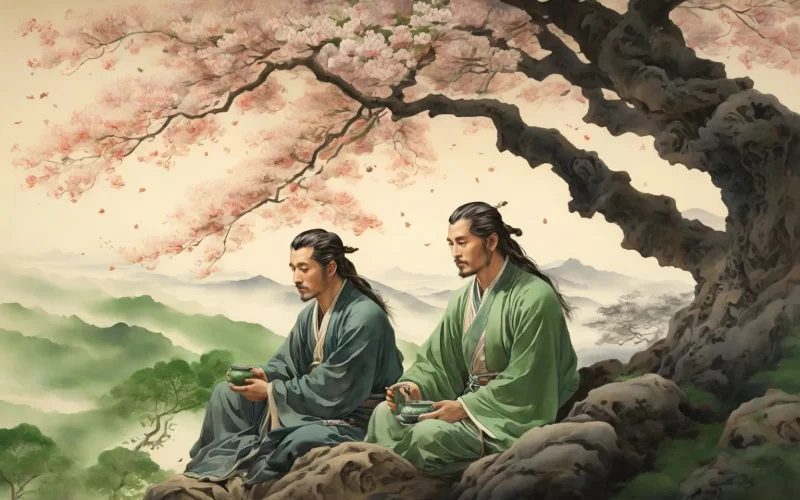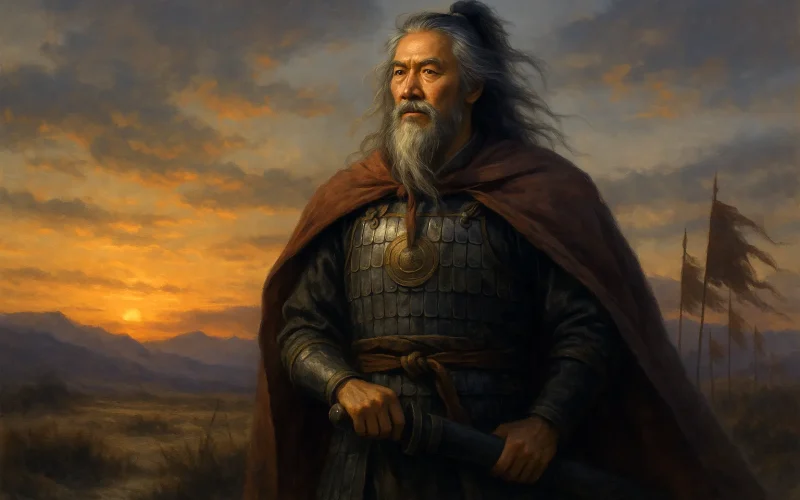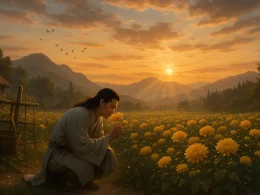All alone in a foreign land,
I am twice as homesick on this day
When brothers carry dogwood up the mountain,
Each of them a branch-and my branch missing.
Original Poem
「九月九日忆山东兄弟」
王维
独在异乡为异客,每逢佳节倍思亲。
遥知兄弟登高处,遍插茱萸少一人。
Interpretation
Composed in 717 AD when Wang Wei was twenty-seven and serving as a court secretary in Chang'an, this poem expresses his longing for family during the Double Ninth Festival. Far from his hometown in Shandong, the young poet observed this traditional occasion—marked by mountain climbing, wearing dogwood sprigs, and drinking chrysanthemum wine—with poignant solitude. Though devoid of ornate language, the poem's restrained depth captures a wanderer's holiday nostalgia, particularly through the imagined scene of brothers' reunion, making it an enduring masterpiece of homesickness in Chinese literature.
First Couplet: "独在异乡为异客,每逢佳节倍思亲。"
Dú zài yìxiāng wéi yì kè, měi féng jiājié bèi sī qīn.
"Alone, a stranger in strange lands I roam; / Each festive day doubles my yearning for home."
The opening establishes isolation through repetition of "strange" (异), while "doubles" (倍) intensifies the emotional paradox: festive joy amplifies loneliness.
Second Couplet: "遥知兄弟登高处,遍插茱萸少一人。"
Yáo zhī xiōngdì dēng gāo chù, biàn chā zhūyú shǎo yī rén.
"Afar, I see my brothers climb the height, / Wearing dogwood—one branch less in sight."
The imagined reunion ("Afar, I see") underscores absence. The "one branch less" (少一人) symbolizing the poet's missing presence achieves profound economy—a single detail evoking collective familial rupture.
Holistic Appreciation
In just twenty characters, Wang Wei constructs an emotional crescendo: from solitary confession to visualized family ritual. The poem's power lies in its ceremonial specificity—dogwood and mountain climbing transform private longing into universal resonance. By channeling grief through others' actions ("Wearing dogwood—one branch less"), the poet elevates personal absence to collective memory, achieving what critic Zhong Rong termed "unspoken sorrow deeper than spoken."
Artistic Merits
The poem's most striking feature is its "intense emotion conveyed through understated language," using remarkably concise words to express profound sentiment. The poet masterfully channels feelings through seasonal customs, seamlessly blending cultural tradition with personal emotion, transforming the festival scene into a catalyst for emotional transcendence. The line "Wearing dogwood—one branch less in sight" is particularly noteworthy—the word "less" (少) encapsulates the ache of absence with quiet resonance that lingers endlessly.
Furthermore, the poem employs a "shifting perspective—from self to others" technique, transcending solipsistic narration to broaden emotional scope and depth. Without once uttering the word "sorrow" (愁), it has moved readers for millennia—a quintessential example of Wang Wei's artistry where "painting breathes within poetry, and poetry pulses within painting."
Insights
The poem articulates a timeless truth: meaningful traditions heighten the ache of separation. Wang's genius lies in showing how rituals designed for unity ("Wearing dogwood") inevitably memorialize absence. For modern readers, it invites reflection on how our own celebrations—whether Lunar New Year or Thanksgiving—similarly crystallize presence and loss across dispersed families.
Poem translator
Kiang Kanghu
About the poet

Wang Wei (王维), 701 - 761 A.D., was a native of Yuncheng, Shanxi Province. Wang Wei was a poet of landscape and idylls. His poems of landscape and idylls, with far-reaching images and mysterious meanings, were widely loved by readers in later generations, but Wang Wei never really became a man of landscape and idylls.











